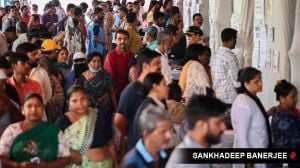Consensual Sensex
Only God can save the country when our fund managers and brokers start holding forth on coalition politics and using words like 8220;polity...

Only God can save the country when our fund managers and brokers start holding forth on coalition politics and using words like 8220;polity8221;, 8220;body politic8221; and 8220;jockeying for power8221;. We journalists have been working full-time at figuring out our politics and still get it wrong all the time. So only if these guys would focus on what they are good at: Making money and leaving politics to us Dilliwalas, sparing us, for heaven8217;s sake, their 8220;take8221; on Laloo8217;s intention, Sharad8217;s intervention, V.P. Singh8217;s mediation and the Left8217;s meddling. This is actually our first election where each twist and turn of government formation is measured by our TV anchors in terms of 8220;meanwhile the Sensex rose/fell after it was reported that Laloo left for Patna or returned and went to Sharad Pawar8217;s house from the airport8221;.
The stock market8217;s sudden fascination for politics is a dangerous new trend and must be squashed. If this infection grows the markets will never learn to focus back on the so-called fundamentals, profits, sales, return on capital employed and so on. Similarly, if our politicians have to now put up with the additional tension of the Sensex movements each time they throw a minor tantrum, how will they run their own business? The last thing we need in these drab times is that our politics should lose all drama and fun because it disturbs the markets. So maybe, G.N. Bajpeyi should initiate a move at SEBI to shut down the markets for a week the next time an election takes place. It is difficult to save us from excesses of our politicians through any fiat. But at least this will save us from the tyranny of the so-called 8220;bear cartel8221;, which is fast emerging as the most ubiquitously dangerous new influence on our politics since the 8220;foreign hand8221; of the seventies.
Every day you see a parade of nervous tie-clad market experts give you their take on how each 20-point movement in the Sensex is linked to some new political twist which gets undone in the next hour so as the market stages a 8220;smart recovery8221;. The index falls 30 seconds after Sitaram Yechury or A.B. Bardhan8217;s face appears on television screens threatening to shut down the disinvestment ministry or to send the bear cartel to some Gulag Sundarbans. It then recovers exactly 30 seconds after the good doctor applies the balm. But every now and then you are presented with a moment you8217;d cherish for a long time.
Like Rajdeep Sardesai of NDTV cruelly trying to get a dialogue going between Udey Kotak and Bardhan. He might as well have put Marx against Malcolm Forbes, Lenin against George Soros. Each time Kotak spoke, searching for a little succour, he was hit in the neck. Even Bardhan, after dismissing all suggestions of privatisation, labour law amendments or what he called 8220;LPG8221; liberalisation, privatisation and globalisation and stating contemptuously that just because the market 8220;does not like us we cannot disappear from the scene8221;, perhaps noticed the fright on Kotak8217;s face, and melted a bit. You know the Chinese Communists, he said, they are the builders of the world8217;s most profitable stock market8230; like them, we are also builders, not destroyers. It was such a pity this was said in a late night show and not during the trading hours or it would have been fascinating to see the Sensex movements while this third degree went on live on your TV screens.
A rare sliver of optimistic wisdom in these prime time follies came from Bombay Stock Exchange Chairman Ramesh Damani. He said the arrival of the Left in the power structure was not such a bad thing after all. And then he delivered a soundbite that any rent-a-quote pundit like one of us would have been proud of: No reforms can finally succeed unless the Left is a part of the process just as there could be no real peace with Pakistan without the BJP being in command, or words to that effect.
While the most vocal and visible leaders of the Left may not have said anything lately to justify this, there are several facts to consider before we conclude that all is lost. First, the way the Common Minimum Programme is evolving for now, shows a fair bit of give-and-take by the Left. They have not given up on everything but the formulations on privatisation, FDI, taxation and public spending policies are most far removed from their classical positions. It is a different matter though that they are not so distant from what they have been doing in West Bengal in the past couple of years.
Certainly now there will be no strategic sale of profit-making PSUs. But again, even under the NDA government, no such sale had taken place since CMC was bought by the Tatas in 2002. The NDA had similarly struggled to sell or close down even such chronic loss-makers as Cycle Corporation of India. And they were hobbled not by the Left but by their own ally Mamata. Since good is not the enemy of the best, it might just be a rare opportunity for this coalition to quickly shut, restructure or sell the chronic loss-makers and nurse the profit-making makers while the Left is on its side, helping resettle, retrain, compensate and stabilise the labour force?
In India, while the perfect solutions are never practical, nothing means the end of the road either. Like a batsman on a tricky pitch waiting for the bad ball to hit, a reformer has to see what he can do and when and leave what he cannot to another reformer, blessed with a different set of circumstances. Selling a profit-making company in some ways is easier, because the buyer re-employs or compensates the labour. Closing a chronic loss-maker results necessarily in an immediate loss of jobs. If the Left is willing to help in this process, it is an opportunity. The same could apply to labour law reform. If anybody in the NDA thought he could do so without taking the unions along, he would soon have heard from the leaders of the Bharatiya Mazdoor Sangh, the trade union arm of the RSS.
Much would depend now on how the Left responds as this coalition goes along, but if one haemorrhaging PSU is closed like this, much on the pattern followed by the Buddhadeb Bhattacharya government in West Bengal, you would see the Sensex climbing once again. Further, in retrospect, wasn8217;t it useful that the Left became a part of the 1996-98 United Front government and therefore sanctified a serious wave of reforms that included lowering of taxes and tariffs, easing of FDI norms, setting up of the Disinvestment Commission and Chidambaram8217;s dream budget. Even if you read that 1996 CMP, it is a reasonably reformist document, the new one should only be an improvement on it. And because the Left will be a party to it, it will be a step forward in the direction of evolving a genuinely bipartisan support for reform.
Or that, at least, is my 8220;take8221; on the politico-economic situation on this chaotic Friday afternoon. I may be living dangerously in leaving it to the wisdom of the Left to eventually vindicate me or make me look like a fool. But even that is a safer bet than guessing who will be in the ministry and which portfolio will go to whom.
Write to sgexpressindia.com
- 01
- 02
- 03
- 04
- 05































